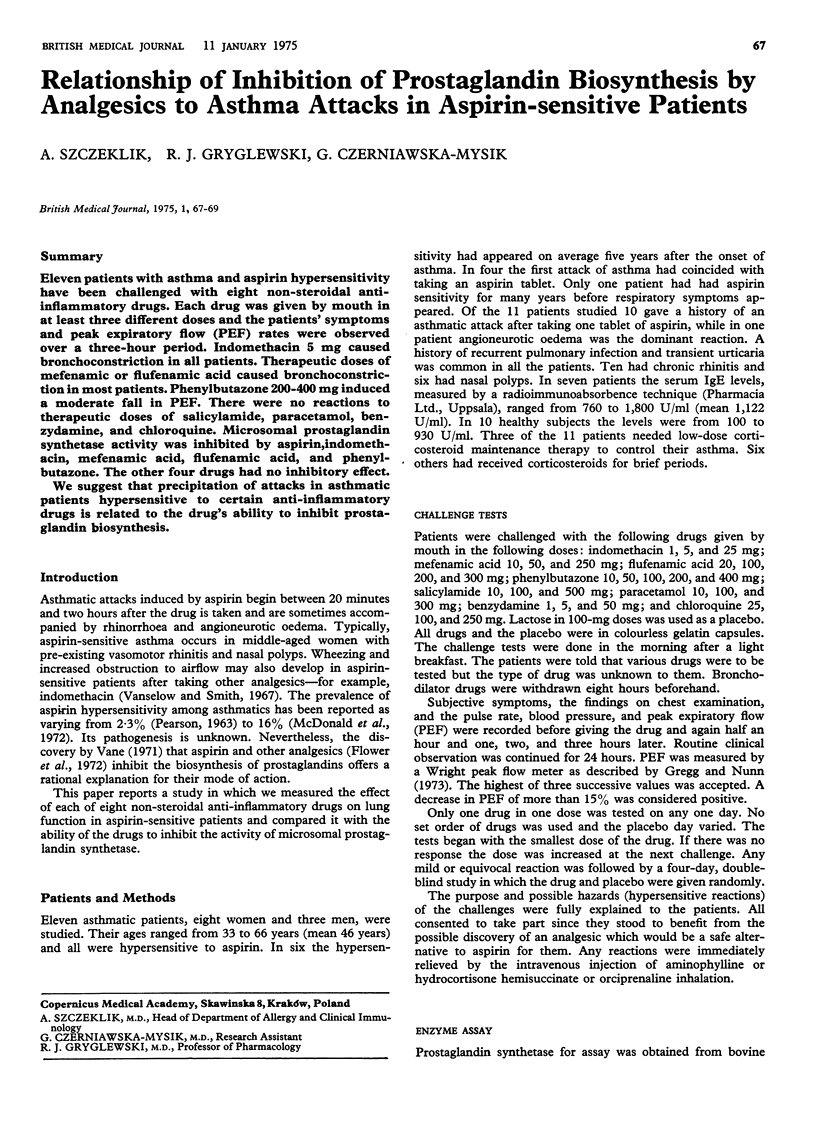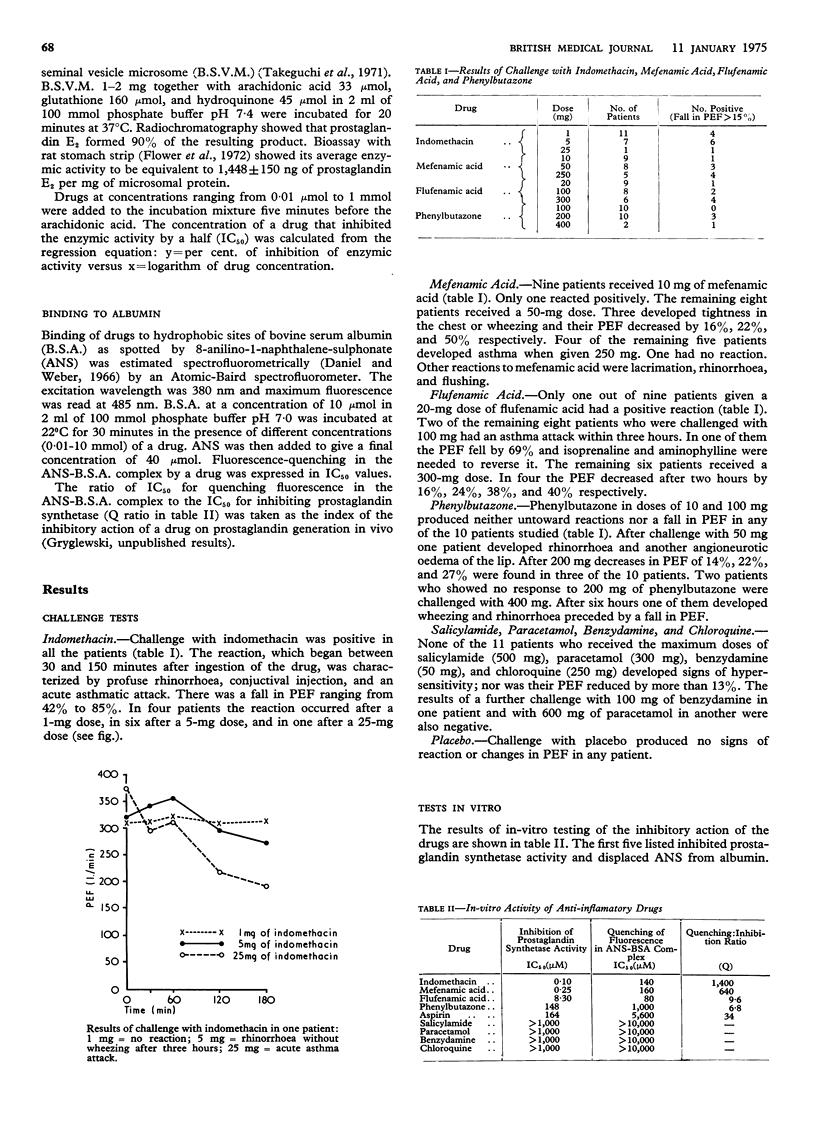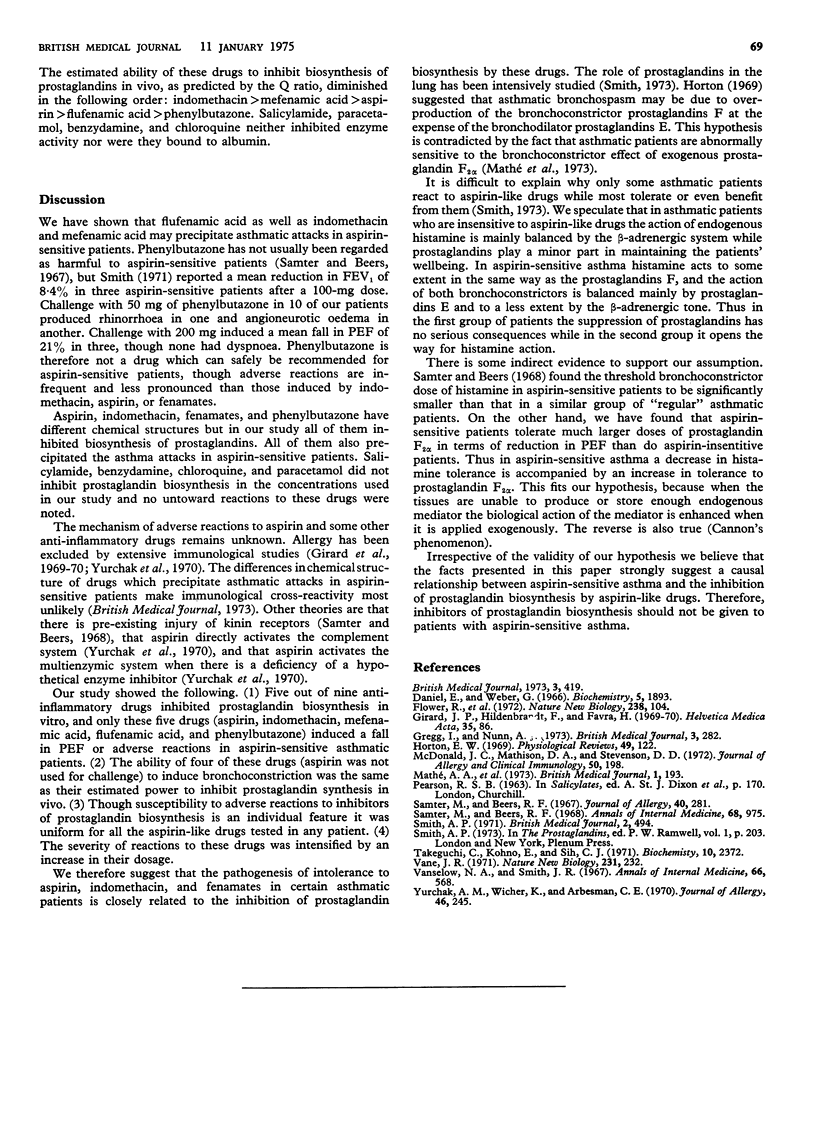Abstract
Eleven patients with asthma and aspirin hypersensitivity have been challenged with eight non-steroidal anti-inflammatory drugs. Each drug was given by mouth in at least three different doses and the patients' symptoms and peak expiratory flow (PEF) rates were observed over a three-hour period. Indomethacin 5 mg caused bronchoconstriction in all patients. Therapeutic doses of mefenamic or flufenamic acid caused bronchoconstriction in most patients. Phenylbutazone 200-400 mg induced a moderate fall in PEF. There were no reactions to therapeutic doses of salicylamide, paracetamol, benzydamine, and chloroquine. Microsomal prostaglandin synthetase, activity was inhibited by aspirin, indomethacin, mefenamic acid, flufenamic acid, and phenylbutazone. The other four drugs had no inhibitory effect. We suggest that precipitation of attacks in asthmatic patients hypersensitive to certain anti-inflammatory drugs is related to drug's ability to inhibit prostaglandin biosynthesis.
Full text
PDF


Selected References
These references are in PubMed. This may not be the complete list of references from this article.
- Daniel E., Weber G. Cooperative effects in binding by bovine serum albumin. I. The binding of 1-anilino-8-naphthalenesulfonate. Fluorimetric titrations. Biochemistry. 1966 Jun;5(6):1893–1900. doi: 10.1021/bi00870a016. [DOI] [PubMed] [Google Scholar]
- Flower R., Gryglewski R., Herbaczyńska-Cedro K., Vane J. R. Effects of anti-inflammatory drugs on prostaglandin biosynthesis. Nat New Biol. 1972 Jul 26;238(82):104–106. doi: 10.1038/newbio238104a0. [DOI] [PubMed] [Google Scholar]
- Horton E. W. Hypotheses on physiological roles of prostaglandins. Physiol Rev. 1969 Jan;49(1):122–161. doi: 10.1152/physrev.1969.49.1.122. [DOI] [PubMed] [Google Scholar]
- McDonald J. R., Mathison D. A., Stevenson D. D. Aspirin intolerance in asthma. Detection by oral challenge. J Allergy Clin Immunol. 1972 Oct;50(4):198–207. doi: 10.1016/0091-6749(72)90014-0. [DOI] [PubMed] [Google Scholar]
- Samter M., Beers R. F., Jr Concerning the nature of intolerance to aspirin. J Allergy. 1967 Nov;40(5):281–293. doi: 10.1016/0021-8707(67)90076-7. [DOI] [PubMed] [Google Scholar]
- Samter M., Beers R. F., Jr Intolerance to aspirin. Clinical studies and consideration of its pathogenesis. Ann Intern Med. 1968 May;68(5):975–983. doi: 10.7326/0003-4819-68-5-975. [DOI] [PubMed] [Google Scholar]
- Smith A. P. Response of aspirin-allergic patients to challenge by some analgesics in common use. Br Med J. 1971 May 29;2(5760):494–496. doi: 10.1136/bmj.2.5760.494. [DOI] [PMC free article] [PubMed] [Google Scholar]
- Takeguchi C., Kono E., Sih C. J. Mechanism of prostaglandin biosynthesis. I. Characterization and assay of bovine prostaglandin synthetase. Biochemistry. 1971 Jun 8;10(12):2372–2376. doi: 10.1021/bi00788a030. [DOI] [PubMed] [Google Scholar]
- Vane J. R. Inhibition of prostaglandin synthesis as a mechanism of action for aspirin-like drugs. Nat New Biol. 1971 Jun 23;231(25):232–235. doi: 10.1038/newbio231232a0. [DOI] [PubMed] [Google Scholar]
- Vanselow N. A., Smith J. R. Bronchial asthma induced by indomethacin. Ann Intern Med. 1967 Mar;66(3):568–572. doi: 10.7326/0003-4819-66-3-568. [DOI] [PubMed] [Google Scholar]
- Yurchak A. M., Wicher K., Arbesman C. E. Immunologic studies on aspirin. Clinical studies with aspiryl-protein conjugates. J Allergy. 1970 Oct;46(4):245–253. doi: 10.1016/0021-8707(70)90028-6. [DOI] [PubMed] [Google Scholar]


